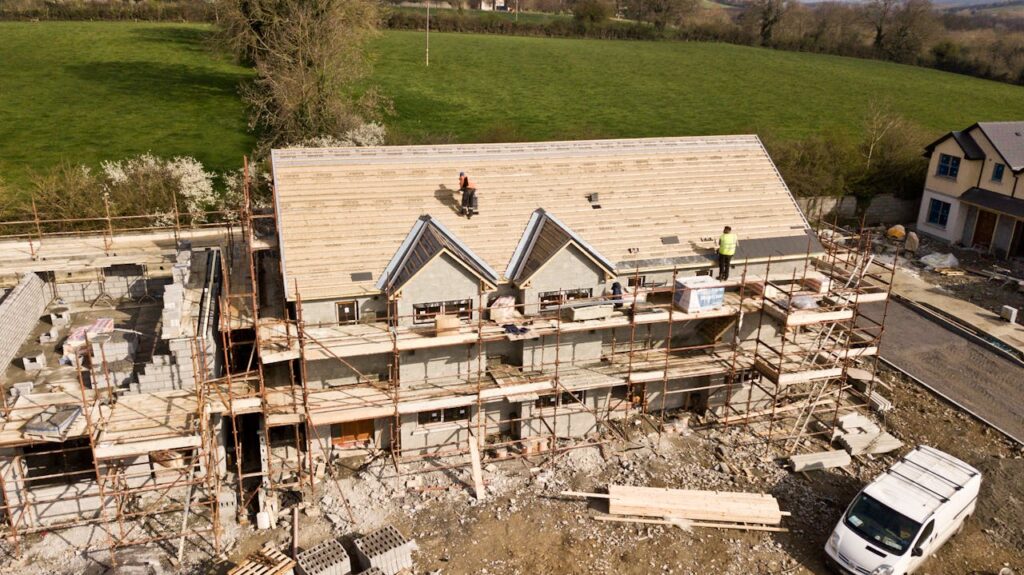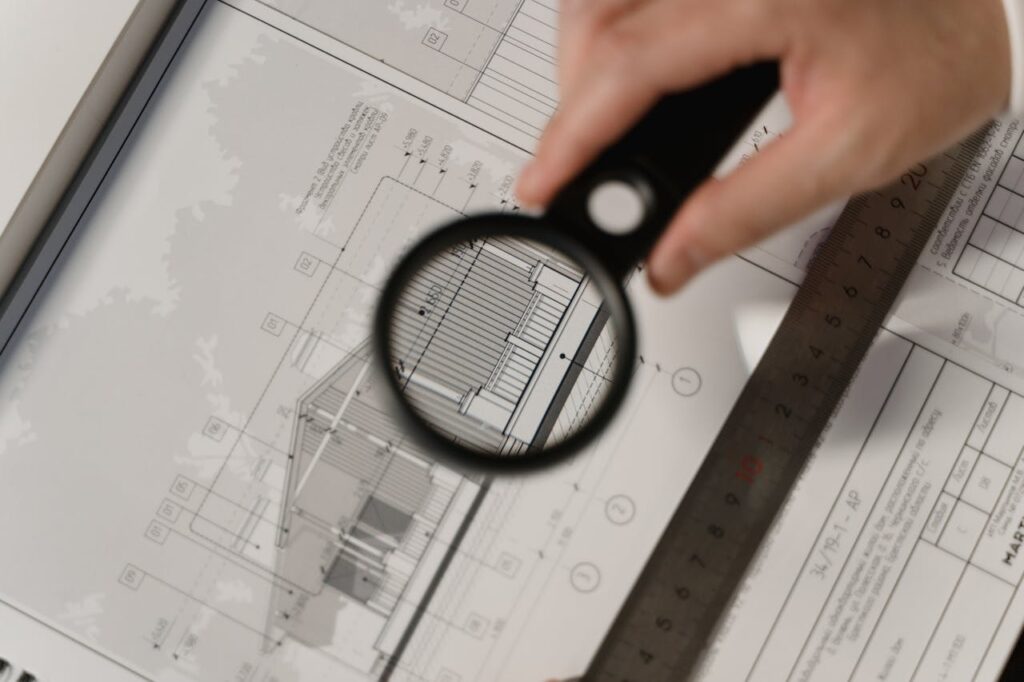With a 1.06% population increase in 2023, finding the perfect home in Georgia is certainly more of a challenge than it used to be. Home values have risen 3.3% year-over-year as of August 31, 2024, and many buyers are discovering that older homes often come with safety issues like outdated electrical, asbestos, and lead paint. Instead of showing after showing of sub-par homes, why not just build a new one?
This guide explores how a construction loan Georgia can help you finance your dream home. Building your own home is a way to avoid the issues of aging homes and limited inventory while also tapping into the Peach State’s booming housing market.
Please note that we currently do not offer residential ground-up construction loans from primary residences at Defy Mortgage, and we do not provide owner-builder loans for primary residences. Builder approvals are required for select financing options for primary residences.
Construction Loan Georgia Basics
What Is a Construction Loan?
A construction loan is a short-term financing option that’s used to build a new home or significantly renovate an existing property. After construction is complete, the loan is typically converted into a long-term mortgage.
Construction loans are considered non-QM (non-qualified mortgage) loans since they don’t have to follow the lending criteria set by the Consumer Financial Protection Bureau (CFPB). This means that lenders can set their own qualification requirements for construction loans, so there’s no set requirements across the industry.
Defy specializes in alternative financing like DSCR loans and other non-qm lending options offering flexible solutions for borrowers who don’t fit the traditional mold. Schedule a free consultation or call us at (615) 622-1032 and one of our mortgage experts would be happy to help!
How Do Construction Loans Work?
Construction loans work differently than traditional loans mainly in the way the loan proceeds are disbursed. Instead of getting the full loan amount as a lump sum, they’re disbursed in stages as the construction progresses. Usually, construction loans cover the cost of the land, building materials, labor, permits, and any other related construction expenses. Lenders slowly release funds to make sure that the money is actually being used for its intended purpose. Many lenders also offer an interest-only period during construction, meaning lower monthly payments until the property is built. When construction is completed, the loan gets converted to a regular long-term mortgage where you’ll have to make both interest and principal payments.

Construction Loans in Georgia
Since 1954, Georgia has always had a growing population, ranging anywhere from 0.54% to 5.64% per year. Pair that with a limited supply of available housing compared to demand, Georgia’s housing market is only getting more and more competitive. It’s clear that more Georgians are turning to new construction to secure their dream homes with 48,000 building permits for single-family properties issued in the past year across the Peach State.
Now is the perfect time to enter the housing market with a construction loan, before Georgia property prices climb even higher. Build your dream home today and enjoy the potential long-term benefits of rising property values in the future.
Construction Loans vs. Conventional Loans
Construction loans and conventional loans are quite different, especially when it comes to financing a new build.
A construction loan is specifically designed to fund the construction process, with funds disbursed in phases as the project progresses. Meanwhile, a conventional loan is typically used to buy an existing home with fixed monthly payments and is provided as a lump sum at closing.
Securing a conventional loan for a new build can be tricky since traditional lenders often need an existing property to appraise or use as collateral. On the other hand, construction loans focus on the as-completed value of the home, the detailed construction plans, and budgets.
Types of Construction Loans
Construction loans aren’t necessarily one-size-fits all – there are plenty to choose from depending on your needs. Here’s an overview of the most common types of construction loans:
- Single-Close Construction Loans: Also known as a construction-to-permanent loan, this loan combines the construction loan and permanent mortgage into a single loan, requiring only one closing.
- Two-Time Close Construction Loan: Two separate loans are used – one for construction and another for the permanent mortgage, each requiring its own closing.
- Lot Loans: A lot loan is used to purchase only the land where the home will be built.
- Construction-Only Loans: A short-term loan that covers only the construction phase. The borrower needs to secure a separate mortgage once the build is finished.
- Renovation Loans: Renovation loans allow borrowers to finance the costs of major renovations or repairs, either for a home they already own or a fixer-upper property.
- Owner-Builder Loans: These loans are for borrowers who plan to act as their own general contractor. Since this role involves more risk, owner-builder loans can be harder to qualify for and require experience in construction management.
Whether you’re buying land, renovating an existing property, or building from scratch, there’s a loan for everyone. Understanding all of the available options can help you choose the best loan for your project.

Construction Loan Georgia Interest Rates
Construction loan interest rates vary depending on the lender, your credit score, and current interest rates. However, due to the nature of construction loans, you can expect rates to be slightly higher than conventional rates. This is because lenders don’t have as much collateral with a construction loan compared to a loan for an existing property.
Construction Loan Georgia Down Payment Requirements
Specific down payment requirements will depend on the lender, but you can expect to put down between 20-25% of the total project cost.
How to Get a Construction Loan in Georgia
Qualifying for a Construction Loan
Since construction loans are considered non-QM, qualification requirements will vary by lender. If you’re still researching your options, we’d recommend reaching out to lenders directly to see what you could qualify for.
Additional Construction Loan Requirements
Beyond borrower requirements, some lenders have additional requirements for construction loans. This can include:
- Land Requirements: Lenders usually require clear ownership of the land, meaning the borrower must own the lot outright or include the land in the purchase. The land should also meet zoning regulations, have access to utilities, and be suitable for the planned construction.
- Home Construction Requirements: Detailed construction plans, budgets, and timelines should be provided for lender approval.
- Builder and Contractor Requirements: Lenders usually require borrowers to work with licensed and insured builders or contractors.

Finding the Right Lender
Finding the right lender for your construction loan lays the groundwork for a successful project. When shopping around for potential lenders, it’s important to ask questions about their experience with construction loans, the types of loans they offer, interest rates, and their specific requirements for builders and projects. Be sure to compare multiple lenders to find the best fit for your needs.
At Defy, as a private lender, we specialize in alternative financing solutions that don’t always fit the conventional mold. We provide other tailored lending solutions for those looking for flexible loan options to fit their unique circumstances. Book a call with us for a free consultation with one of our mortgage experts or give us a ring at (615) 622-1032.
Construction Loan Georgia Alternatives
While construction loans can be a great tool to help homeowners and investors build a property from the ground up, it may not be the best fit depending on your needs.
Here are some alternatives to consider if construction loans don’t provide exactly what you need:
- Bank Statement Loans: Allows you to qualify for a home loan just by using your bank statements.
- P&L (Profit and Loss Statement) Loans: Allows you to qualify for a home loan by using your business’ CPA-prepared P&L statements.
- Fix-and-Flip Loans: Provides funding to buy a property, renovate it, and resell it quickly for a profit.
- Fix-and-Hold Loans: Provides funding to buy a property and renovate it with the intention of holding it for a longer period.
- DSCR (Debt-Service Coverage Ratio) Loans: Allows you to qualify for an investment property loan just by using the property’s rental income.
Defy offers some of these loan options like DSCR loans and Bank Statement loans for example, and more, catering to borrowers who need specialized loan solutions.
Construction Loan Georgia FAQs:
- What is a construction loan, and how does it work in Georgia?
A construction loan is a short-term loan that’s used to finance construction of a new property or significant renovations on an existing property. The funds are disbursed in stages as the construction progresses to make sure that the money is being used for its intended purpose. In Georgia, once the property is completed, the loan is usually converted into a permanent, longer-term mortgage.
- How do I qualify for a construction loan Georgia?
The qualification requirements for a construction loan vary by lender. Generally, you’ll need a good credit score, a down payment of 20-25%, and construction plans and budgets.
- What are the interest rates for construction loans Georgia?
Interest rates for construction loans in Georgia are typically a bit higher than traditional mortgage rates since they’re considered riskier for lenders. Once construction is completed, transitioning to a permanent mortgage can help you secure lower rates. Exact construction loan rates can vary depending on your credit score, down payment, the lender, and current mortgage rates.
- What’s the difference between a one-time close and two-time close construction loan Georgia?
A one-time close construction loan combines that construction portion and permanent financing into one loan, which only requires a single closing. Whereas a two-time close construction loan is essentially two separate loans for the construction phase and the permanent mortgage, which requires two separate closings.
- Can I use a construction loan to purchase land Georgia?
Yes! Most construction loans can be used to purchase the land on which you plan to build.
- How long does the construction loan approval process take Georgia?
Depending on the lender and how complex your construction project is, the average approval time takes 30 to 60 days.
- What are the typical down payment requirements for a construction loan Georgia?
Down payments for construction loans usually range between 20-25% of the project cost, including both the land and construction.
- Can I get a construction loan if I already own the land in Georgia?
Yes! You can get a construction loan even if you already own the land in Georgia. Some lenders may even let you use the land as equity in the construction loan, which could help reduce the down payment requirement.
- What costs are covered by a construction loan Georgia?
Typically, construction loans cover the cost of the land, building materials, labor, permits, and any other related construction expenses.
- What documentation do I need to apply for a construction loan Georgia?
While specific documentation may vary by lender, you can generally expect to provide:
- Detailed construction plans
- A budget
- Contracts with licensed builders or contractors
- Proof of income (some lenders may allow alternative income verification)
- Your credit history and/or report
- Land appraisals (depending on lender)
- Permits (depending on lender)
- Insurance information (depending on lender)
- What happens if my construction project in Georgia goes over budget or takes longer than expected?
If your project goes over budget or faces any delays, it’s important to let your lender know as soon as possible. You may need to request additional funds or cover the extra costs out of pocket.




